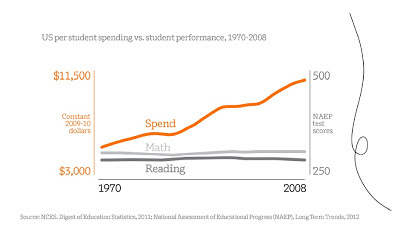Thanks to the close scrutiny of Gary Brandenburg, Bob Somerby, Matt DiCarlo, Dana Goldstein, Diane Ravitch, USA Today, and others, we now know the true story: Rhee was never a miracle worker. She was, at best, an average new teacher (meaning she had a long way to go) and a mediocre large-city superintendent when judged by student achievement (when judged by other criteria, she was clearly a trainwreck).
It's important to get this on the record, because the anti-teacher and anti-union "reforms" Rhee implemented in D.C. - the very ones she wants to impose on the rest of the country - did nothing to affect large-scale changes in educational outcomes. Rhee's argument for "reform" is, in fact, undercut by her own history.
I say that it's time to start applying this same level of examination to other prominent members of the corporate "reform" movement. When they make claims of big successes, those claims ought to be vetted very carefully: after all, why should we listen to what they have to say about holding educators accountable if they aren't held to account themelves?
Which brings us to Joel Klein.
Klein was Chancellor of the New York City schools under Mayor Bloomberg from 2002 to 2010. He is now running Amplify, the education arm of Rupert Murdoch's corporate empire. His resume has given him great influence in the media as a spokesman for corporate "reform," which, in Klein's view, should include buying his techie edu-products.
Klein has an unfortunate habit of twisting the facts to suit his fancy:
- This past year, Klein co-wrote the infamous report on education for the Council on Foreign Relations with Condoleezza Rice. The two attempted to make the case that America's public school system posed a national security risk; they conveniently downplay the United States' 22 percent child poverty rate as the true cause of inequitable educational outcomes. Reportedly, Klein stacked the deck for the report,
- Klein gave a presentation to potential investors in Amplify where he conflated data on school spending with educational outcomes. As I showed, his presentation was totally phony. Klein tried to show that American gains in reading and math were flat while spending was on the rise:
Using the exact same data, I reconstructed his chart to show exactly the opposite:
This is a shameless abuse of statistics and speaks volumes about Klein's willingness to twist facts to meet his own ends.
- In a stunning personal embarrassment, esteemed education researcher Richard Rothstein showed how Klein has dissembled badly about his own childhood and schooling. Klein uses his personal story as "proof" that poverty does not matter in educational outcomes, and that bad teachers are far more responsible for the "achievement gap" than socio-economic factors. Rothstein shows that, in fact, Klein grew up in middle-class surroundings with educated parents and a public education system that served him well.
So we know that Joel Klein is happy to take a spin when it suits his purposes. That gives us more than enough reason to take a look at his claims about his legacy in New York City. Fortunately - and thanks to a heads-up from the great edublogger Gary Rubinstein - Klein has put those claims together in a piece that appeared in the New York Daily News this past fall:
Critics are entitled to their opinions. But they are not entitled to their own facts. The results under Bloomberg are irrefutably and demonstrably strong.
Independent studies by respected researchers like Caroline Hoxby and Margaret Raymond at Stanford, James Kemple at the Research Alliance and the independent public policy institute MDRC all support this conclusion. So do the numbers, which the critics conveniently ignore.
There are three sets of relevant systemic metrics: high school graduation rates, state test exams in grades 4 and 8 for reading and math and federal exams for the same grades and subjects.OK, then: the gauntlet has been thrown. Do Joel Klein's claims stand up to scrutiny? Did the policies he implemented in New York City lead to improvements in graduation rates, state test scores, and federal test scores?
Two things before we get started:
1) Klein himself is setting the standard for "relevancy" here. I frankly think there are many other things we should look at besides these three metrics, but let's leave it at these for now.
2) It's not enough, in this challenge, to show that New York City made gains. If NYC got caught up in nationwide or statewide trends that led to better outcomes, Klein shouldn't be able to take undue credit for them. The real question is whether Klein's policies in NYC led to more gains than in other jurisdictions.
So those are the conditions. It's going to take a few posts to put this all together. Ready? Stand by...
Bring it on...
* A correction: Ravitch wasn't suggested as a member of the task force, but a member did suggest she testify. Klein said no.


